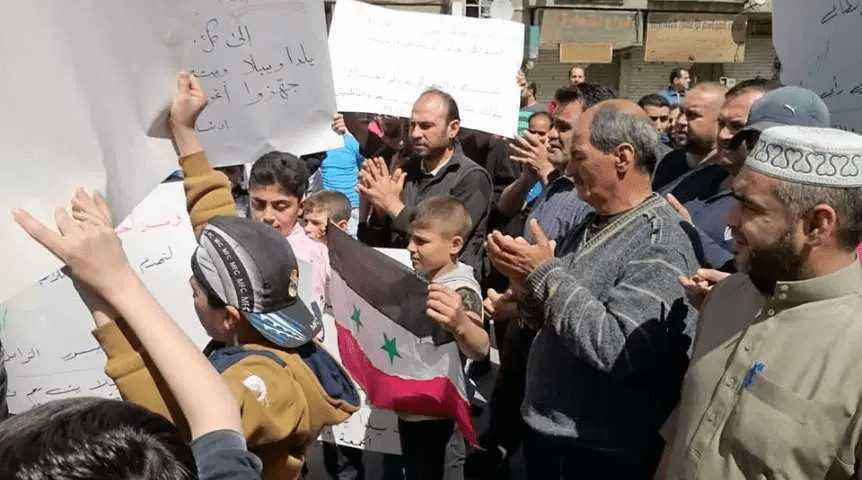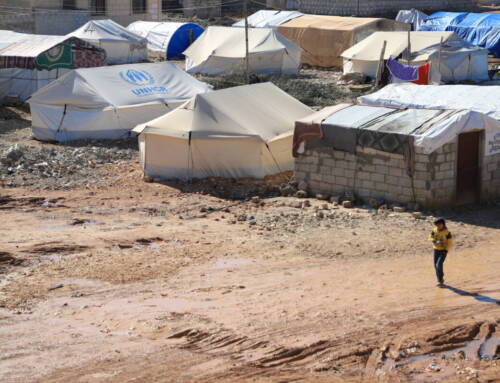‘Ghouta is a glimpse into the future of south Damascus,’ says rebel negotiator
The surrender and evacuation of the East Ghouta suburbs just […]
11 April 2018
The surrender and evacuation of the East Ghouta suburbs just outside Damascus in recent weeks leaves only two remaining rebel-controlled territories in the Syrian capital and its countryside.
In addition to a pocket of territory in the mountainous East Qalamoun region 50km northeast of Damascus, Free Syrian Army (FSA)-affiliated factions hold a handful of towns just 4km south of the capital’s Old City.
Immediately west of the FSA-held south Damascus towns, home to an estimated 50,000 residents, lies a pocket of comparable size held by the Islamic State (IS).
Syrian government soldiers and loyalist militias first encircled IS- and rebel-held south Damascus in mid-2013. One government-rebel crossing at the enclave’s northeastern reaches controls the flow of civilians and goods in and out of the pocket.
The FSA-controlled towns —Babila, Yalda and Beit Sahem—signed onto a reconciliation agreement with the Syrian government in 2014 that eased the siege and enacted a ceasefire but left the final fate of south Damascus uncertain.
Today, the Syrian government’s capture of East Ghouta—a major step toward complete control over the greater Damascus area—has “accelerated” talks over the fate of south Damascus, says Abu al-Fida a-Dimashqi, a negotiator for the rebel factions in south Damascus.
A-Dimashqi is a one of four rebel negotiators from south Damascus that have been meeting with Russian representatives since late March.
“What happened in Ghouta is a glimpse into the future of south Damascus,” he tells Syria Direct’s Ammar Hamou. “That is not reassuring for the factions in south Damascus or any person living in the region.”
Abu al-Fida a-Dimashqi asked not to be referred to by his real name or the rebel faction he is associated with as part of the interview because the negotiators are not authorized to make statements on the state of the talks.

Q: To what extent has the Syrian government’s capture of East Ghouta impacted the negotiation process in south Damascus?
The agreement for the evacuation of Ghouta residents has played an essential role in accelerating [negotiations with a Russian delegation] in south Damascus.
What happened in Ghouta is a glimpse into the future of south Damascus, and that is not reassuring for the factions or people here. Every choice [on the table] comes with a huge cost.
[Ed.: Alexander Ivanov, the spokesman for Russia’s Hmeimim Military Base in Syria, said “the next stop after East Ghouta will be south Damascus and East Qalamoun…” in a March 26 statement posted on the base’s official Telegram channel.]If we refuse to go the route of Ghouta, the Russians and the regime will likely prepare a campaign against the region. The international community wouldn’t lift a finger.
As I see it, the chemical [attack] in Ghouta was a message to rebels in Douma and a message for all of the opposition areas currently negotiating.
Q: Based on your meetings with the Russian delegation in recent weeks, what options do the rebel factions in south Damascus have?
Unfortunately, the choices are slim.
South Damascus is small and besieged, not to mention the Islamic State presence to our west. The Islamic State has largely depleted our forces over the past five years, in addition to the siege.
[Ed.: The FSA-affiliated factions in south Damascus sporadically clash with Islamic State militants, while IS fighters and snipers regularly fire on rebels to the east.]The international community is not on our side, as can be seen by their silence in the face of the evacuation of rebels and residents from Ghouta.
Q: How does the presence of Islamic State-controlled territory immediately to the west affect your current negotiations?
The issue of IS in southern Damascus is at a watershed moment. I believe that there are two ways forward, both of which mean the end of IS in southern Syria.
The first is to make it easier for them to smuggle themselves out of the area, like what has been happening for months, but on a larger scale and at a quicker pace. IS could covertly pull out its leaders and emirs on the down low, leaving the rest of its members, those willing to cooperate, in the region to accept reconciliation and face their fate.
[Ed.: Smugglers are transporting civilians and Islamic State personnelout of encircled south Damascus toward opposition-held territories in northern Syria in exchange for sums reaching $5000, Syria Direct reported in February.]The second solution is a military one: A battle against IS by Russian and Syrian forces in which rebel factions who want to settle their status [could] participate. This option has been proposed [by the Russian delegation], but no deal has been made yet.
The regime previously offered [this military option] to the towns’ civilian negotiators. [Government representatives] asked the civilians to negotiate with local fighters—those open to the idea of reconciliation—about fighting IS in exchange for settling their status.
This [offer] has been proposed multiple times, but nothing like it has been successful.

Q: While the south Damascus factions negotiate with a Russian delegation, a civilian reconciliation committee is negotiating with the Syrian government. What is the difference between these two negotiation processes? Is there coordination?
The difference is the Russians. They focus solely on the military factions, according to [what their representatives stated] in our first meeting with them. They only negotiate with armed groups, and they are not concerned with the administration of the region or its civil affairs. They refused to meet with representatives of the towns, including civil society organizations.
During the latest round of negotiations, there were no joint sessions between the factions and the [civilian] ‘reconciliation’ representatives in south Damascus.
Q: Do you believe that civilians are playing an impactful role in determining the fate of south Damascus? What feedback have you heard from residents and local activists regarding the state of negotiations?
We are dedicated to the safety of our people, and we look after their interests. The faction themselves are all made up of people born and raised here. For years, we have made decisions based on a mutual partnership with the community.
Local activists have been voicing some dissatisfaction [with the negotiations], but as I see it, they are just looking to get information before anyone else. They want to know the details.







